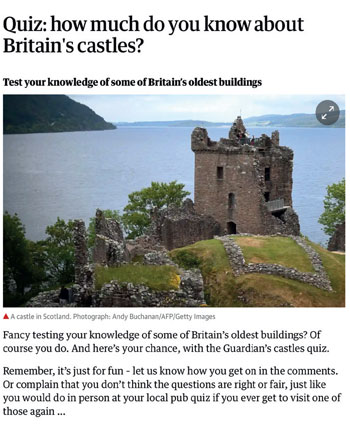
Interactive quizzes online may not be enjoying the heyday they had in the mid-2010s, when it seemed you couldn’t move for people demanding you press a few buttons to find out how Northern you are, but they are still solid performers as part of a digital publishing offering.
At the Guardian, they regularly deliver us engaged audiences who will spend two or three minutes with us, and we know from our metrics that they really appeal to our most regular readers and loyal subscribers. I’ve been setting online quizzes for more than a decade now, and here are some of the things that I’ve learned during that time.
People love a challenge
Everyone loves a challenge and wants to put their knowledge to the test. It means that a correctly pitched quiz can be irresistible. Think about how the headline is going to appear on your site – questions like, “Could you still pass your driving theory test” or, “Can you still answer GCSE Maths questions” can really draw people in. We often launch our quizzes around 11am, so that they appear new and fresh on the website just as people are going to be looking for distractions over their lunch hours.
They are very shareable – especially with fandoms and enthusiasts

A well-crafted interactive quiz can be a great way to bring in a new and different audience to your site. Even what might seem like a dry-ish subject, a Guardian quiz about British castles this year for example, earned tweets and Facebook shares from some of the castles featured and heritage enthusiasts, potentially bringing in readers who might never normally visit the Guardian website. If you set a quiz on something with a really enthusiastic fandom – like Star Wars or Pokémon – then, provided you do a decent job writing it, you can expect to see it shared far and wide. Just don’t make mistakes. Which brings me to…
Nothing will get you a slew of angry emails faster than some broad England-centric generalisation in a question or answer.
People are guaranteed to get angry though
I’ve found that no matter how many times I write into my quiz copy that “there are no prizes” and that “this is just for fun”, you’ll always generate complaints. I think the low point for me was someone writing me an 800 word angry email because I’d asked a question about the relative lengths of coastlines in Europe. They explained that, as any fool knows, because of fractal theory, it is actually impossible to measure the length of any coastline.
I mean, I get your point mate, but also 1) the answer is still Norway and 2) it gave me the opportunity to do a Douglas Adams’ Hitchhiker's Guide to the Galaxy Slartibartfast joke, so there was no way I was changing it.
But there’s a couple of specific pitfalls that I’ve learned to be very conscious of.
One is accidentally writing an ambiguous question. What normally happens here is someone will contact me to say that question 3 is wrong because of some reading of it that I hadn’t intended. I reply to say “No, it means x”. Then a second email or comment arrives saying the same thing, and I send a slightly chippier reply to it, defending my original wording. Then a third email arrives and I send back an apology and explain that I’m re-writing the question even as we speak.
A second thing is being scrupulously conscious around the correct usage of the terms British Isles, Great Britain and UK. This also means being aware of how the education systems, legal systems and devolved powers work across these islands. Nothing will get you a slew of angry emails faster than some broad England-centric generalisation in a question or answer.
There’s a broader point here though. Whether it is opening comments underneath the quiz or directing readers to an email address, give people a direct way to get in touch with you as soon as the quiz is published. It’s by far the quickest and easiest way to find out what you’ve got wrong.
You can use them to make a point

Legendary Guardian deputy editor Paul Johnson once said to me that making mischief is great but it also needs to have some oomph. To that end, I’ve sometimes found myself writing entertaining quizzes that are jokey and fun, but that have a kernel of truth at their heart that the questions reinforce. A quiz like, “Can you match the Donald Trump insult to the country he insulted?” ends up being funny, but also pointing out that the most senior politician in the US has trash-talked just about every major ally of the United States. Likewise, “Who said it, Donald Trump or Elon Musk?” highlights just how ludicrous some of the futuristic boasts both men have made are.
And you can tackle serious subjects with a quiz. In August 2020, I put together a quiz on how well you understand the UK’s coronavirus lockdown restrictions. Written essentially by taking the rules set out by authorities in England, Scotland, Wales and Northern Ireland, through a series of questions, it illustrated the strange conflicting advice and regulations being given across the country, and that it was surely impossible for someone to get their head around them all. You didn’t need to write an opinion piece about the instructions being contradictory and arbitrary – it simply became obvious to the reader as they progressed through the quiz.
They are a great vehicle for delivering ‘explainer’ material
We had another coronavirus-related quiz in April, asking how much you knew about it, with the strapline, “You’ve been bombarded with information about the coronavirus for weeks – how much have you taken in?”
It was a re-purposing of the Q&A content that had been written by the Guardian’s experts like health editor Sarah Boseley or science correspondent Hannah Devlin into a clickable question format. The Guardian’s website quiz tool allows you to deliver answer text to the user after they’ve clicked or tapped the option button. It means you don’t just tell them they’ve got it right or wrong, it gives you an opportunity to explain why it is right or wrong.
Tone is important – and you can get quite dark
Probably the most sensitive topic tackled by a Guardian quiz this year was one about the new Hong Kong national security law imposed by China. Written by Lily Kuo, our Beijing bureau chief and Helen Davidson, a news reporter for Guardian Australia, we formatted it in such a way that it put over just how oppressive the new directive was.

Question after question asked, “Which of these things is illegal under the new law”, and each time, the answer would be the final option – “All of them”.
Towards the end, it simply asked, “You are doing this quiz on the Guardian website or app. While you are doing it, does the Hong Kong national security law apply to you?”. The answer is ‘yes’, as the law is written so widely that it applies to anybody, regardless of whether you are in Hong Kong, or indeed regardless of whether you have even ever visited it.
The final message to the reader was, “Thank you for doing our quiz. There are no prizes. We hope it was an interesting way for you to find out more about the broad and sweeping way in which the authorities have been using the national security law to clamp down on freedom in Hong Kong.”
Get yourself a recognisable voice
Tone is one thing, but developing a recognisable voice is also a way of making the quizzes more satisfying to do. You know on TV that an Only Connect question is a very different proposition to a The Chase question which is a very different proposition to the questions on Richard Osman’s House of Games. You want to establish that kind of identity in the way you compose quizzes.
It may be a little bit vain, but there’s nothing as satisfying as getting a message from someone saying, “I hadn’t looked at the byline but by the time I got three questions in, I knew this was from you”. I think the British pub quiz is a great way of looking at this. A successful pub quiz will usually have an entertaining host who keeps the whole thing moving along. Think about what the questions would sound like if they were read out loud.
Another way of developing voice is with a recurring joke or motif. I’ve made it a trademark to always – unless it would be wildly inappropriate – slip in a reference to Doctor Who in either one of the questions or answers. When I was writing weekly politics quizzes in the run-up to the 2019 General Election, it became a thing that people would compete in the comments to be the first person to spot it and post about it. It really added to the community feeling around the quizzes.
Above all, don’t be afraid of fun
Maybe it is just me, but in the middle of a pandemic and a climate crisis, a lot of the internet seems rather more po-faced than it ever did when I was first messing around on the web. People like fun, and they like being entertained. You aren’t setting the questions for an exam or University Challenge.
For me, the optimum result is if everybody finishes the quiz, most people get a rewarding score of around 70%-85%, they learn one or two things along the way, and get a couple of wry smiles or even the odd laugh out loud moment. After all, isn’t that why people do quizzes?
People like fun, and they like being entertained.
This article was first published in InPublishing magazine. If you would like to be added to the free mailing list, please register here.












